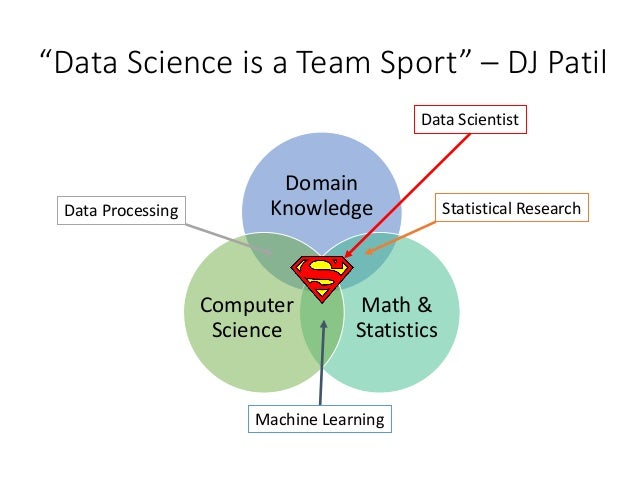數據科學(英語:data science),又稱資料科學,是一門利用數據學習知識的學科,其目標是通過從數據中提取出有價值的部分來生產數據產品[1]。它結合了諸多領域中的理論和技術,包括應用數學、統計、模式識別、機器學習、數據可視化、數據倉庫以及高性能計算。數據科學通過運用各種相關的數據來幫助非專業人士理解問題。 數據科學技術可以幫助我們如何正確的處理數據並協助我們在生物學、社會科學、人類學等領域進行研究調研。此外,數據科學也對商業競爭有極大的幫助。
資料科學學習路徑

資料科學學科
資料科學自學工具

資料科學自學參考網站
(1)How to Improve Your Domain Knowledge
1. Research – I once worked on a project that involved the development of an MRP application. At the start of the project, I felt overwhelmed and completely out of my comfort zone. I knew I had to get up to speed and fast. I downloaded as many papers and case studies as I could find online and read up on what other businesses in the industry were doing. It took time and sweat but it eventually paid off. I eventually started “talking the talk”.
2. Interview Key Stakeholders – Arrange to meet with subject matter experts. This meeting can be an informal meeting in a café or a workshop setting. Stakeholders are usually open to providing information if they know the benefits that are likely to come their way if they do. The more knowledgeable the stakeholder, the better. Start with open-ended questions before asking specific questions. The more open-ended the questions are, the more you will learn.
To learn, you need to ask questions. The quality of follow-up questions you can ask however, depends largely on how well you understand the domain – a typical chicken and egg situation.Note that there's a limit to how many fundamental questions about the domain you can ask stakeholders. They may start to lose confidence in your abilities if they have to start explaining the “basic” principles of the domain to you. 3. Keep a Knowledge Book – For any project I start in a new domain, I keep what I like to call a “Knowledge Book”. In this excel workbook, I enter all the information I have gathered about the domain – process information, participants, facts, definitions and acronyms related to the domain. This book becomes my faithful companion and ever-reliable reference guide.
4. Immerse Yourself – Immerse yourself in the domain by talking to users and subscribing to newsletters that provide industry updates. Be in a state of continually seeking the knowledge you need to deliver the expected benefits. For example, if you're in the insurance industry, subscribe to websites like Insurance Times for regular updates.
5. Gain Industry Certification - This is a longer and perhaps tougher route and you may not have enough time if you are working on a fast-paced project. This route is however, preferable if you would like to have a deep knowledge of a specific business area. The CPA accreditation for example, is designed for accountants, CEHA for real estate and CLP for Logistics Professionals, to mention a few. Decide what level of knowledge you would like to attain and find out how much experience you need to proceed with the certification.
6. Find Training Courses: Take advantage of free courses online that teach fundamental concepts in specific domains. Here's an article on this: Improve Your Domain Knowledge With This List Of Free Courses.
(2)Understanding the Business Domain
Here are some thoughts about the questions to ask and answer to get a high-level understanding of how a business works.
- Who is the customer?
- What is the product?
- How is the product sold? (online, phone, in-person sales)
- What is the cost structure of the product? (subscription, pay-per-unit, etc)
- Where does the money go?
- How do we fulfill or distribute the product?
- How do we produce or service the product?
- How do we support the customer?
- How do we market the product?
- What partners do we work with to do business? How do we manage these relationships?
- What information does the organization manage? Who is responsible for creating, updating, and retiring information? What systems are used to manage the information
(3) 8 Proven Ways To Increase Your Domain Knowledge In A Project
1. Research What Knowledge To Build
2. Ask Questions
3. Sign Up For A Course
4. Attend Industry Events
5. Build A Knowledge Base
6. Join A Knowledge Community
7. Find A Mentor
8. Offer Your Services


 留言列表
留言列表

